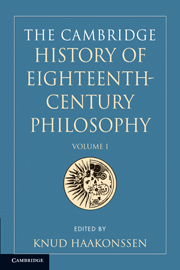Book contents
- Frontmatter
- CONTENTS
- Preface
- Methods of reference and abbreviations
- List of contributors
- I The Concept of Eighteenth-Century Philosophy
- II The Science of Human Nature
- 7 Philosophical Methods
- 8 Human Nature
- 9 Perception and Ideas, Judgement
- 10 Self-Consciousness and Personal Identity
- 11 Reason
- 12 Substances and Modes, Space and Time
- 13 Causality
- 14 Knowledge and Belief
- 15 Scepticism
- 16 Philosophy of Language
- 17 Rhetoric
- 18 Aesthetics
- 19 The Active Powers
- 20 Education
- Biobibliographical Appendix
- Bibliography
- References
10 - Self-Consciousness and Personal Identity
from II - The Science of Human Nature
Published online by Cambridge University Press: 28 March 2008
- Frontmatter
- CONTENTS
- Preface
- Methods of reference and abbreviations
- List of contributors
- I The Concept of Eighteenth-Century Philosophy
- II The Science of Human Nature
- 7 Philosophical Methods
- 8 Human Nature
- 9 Perception and Ideas, Judgement
- 10 Self-Consciousness and Personal Identity
- 11 Reason
- 12 Substances and Modes, Space and Time
- 13 Causality
- 14 Knowledge and Belief
- 15 Scepticism
- 16 Philosophy of Language
- 17 Rhetoric
- 18 Aesthetics
- 19 The Active Powers
- 20 Education
- Biobibliographical Appendix
- Bibliography
- References
Summary
This chapter deals with a number of related issues concerning the human self. The first section examines the notion of consciousness and associated concepts, such as reflection, which were central to fundamental philosophical discussion in the eighteenth century. The second section is concerned with the issues of personal identity, in which the notion of consciousness plays a crucial role, and the nature of the mind. These two sections, for the most part, cover material from the early eighteenth century to the 1770s only. The third section is devoted to the most important development during the 1780s and 1790s: the notions of transcendental self-consciousness and self-identity in the works of Kant and Fichte, which play a central and systematic role in their respective systems of philosophy and which greatly influenced the development of German Idealism in the early nineteenth century.
RELATING TO THE SELF: CONSCIOUSNESS AND REFLECTION
What was meant by ‘consciousness’ and what was the function of this notion in eighteenth-century theoretical philosophy? In some contexts, consciousness was thought of as relating to external objects, but generally it was understood as a way of relating to oneself. This inner-directed consciousness is the main focus of this section. Now, to say that consciousness is a form of relating to the self is basically to say that it is to be understood as self-consciousness, but it remains to be explained what form of self-relation this was held to be and how it connected with other forms of relating to the self. There appears to be no general agreement among eighteenth-century philosophers as to precisely what kind of self-relation terms such as ‘consciousness’ or ‘self-consciousness’ denote.
- Type
- Chapter
- Information
- The Cambridge History of Eighteenth-Century Philosophy , pp. 286 - 318Publisher: Cambridge University PressPrint publication year: 2006
References
- 6
- Cited by

